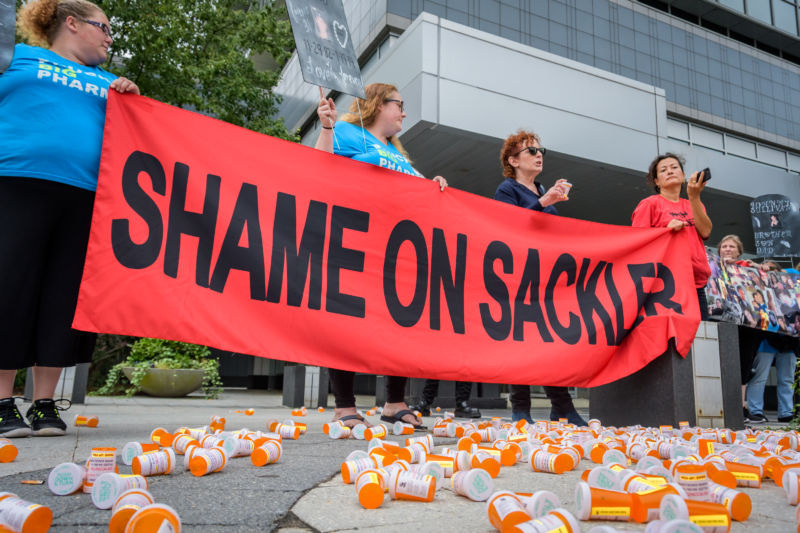
The infamous megarich Sackler family will pay $235 million in civil penalties as part of a controversial $8.3 billion settlement with the US Department of Justice.
Members of the Sackler family own and formerly directed Purdue Pharma, which introduced the powerful opioid painkiller OxyContin in 1996. Throughout the years, Purdue and members of the Sackler family have been accused of using aggressive, misleading marketing tactics to push the highly addictive opioid painkiller on doctors and patients, which helped spark a massive nationwide epidemic of opioid abuse and overdose. So far, nearly 450,000 people have died from opioid overdoses in the United States during the past two decades, and the epidemic is still ongoing.
As part of the settlement with the federal government, Purdue will plead guilty to one count of defrauding the United States and two counts of violating the anti-kickback statute. Between 2009 and 2017, Purdue paid two doctors via the company’s doctor speaker program to increase opioid prescriptions to patients, according to the Justice Department. In 2016, the company also paid an electronic medical records company to install prompts and alerts in its software that would refer, recommend, and set up ordering for Purdue’s opioid drugs for patients.
“The kickback effectively put Purdue’s marketing department in the exam room, with a thumb on the scale, at precisely the moment doctors were making critical decisions about patient health,” Christina Nolan, US Attorney for the District of Vermont, said at a Justice Department briefing. She noted that the software alerts had “fired more than 230 million times” between 2016 and 2019, before her office began investigating them.
With the criminal guilty pleas, Purdue agreed to a criminal fine of $3.544 billion and an additional $2 billion in criminal forfeiture. Purdue also agreed to a civil settlement of $2.8 billion to resolve its civil liability under the False Claims Act. That brings the grand total of the settlement to $8.344 billion.
Justice failure
Separately, the Sackler family agreed to pay $225 million in damages for civil liability under the False Claims Act liability. They family will also relinquish control of Purdue, which is set to become a public-benefit company aimed at providing anti-addiction and overdose rescue drugs. The agreement stems for the roles of Richard Sackler, David Sackler, Mortimer D.A. Sackler, Kathe Sackler, and Jonathan Sackler, who previously directed the company and were involved in the alleged illegal and deadly push to overprescribe opioids.
The Justice Department hailed the settlement as a victory against “greed and violation of the law [that] prioritized money over the health and well-being of patients” and which lead to a “national tragedy of addiction and deaths.”
But victims of the epidemic and some states’ attorneys general see it as a failure that doesn’t fully hold Purdue executive and members of the Sackler family responsible for their role in the public health crisis.
“DOJ failed,” Massachusetts Attorney General Maura Healey said in a tweet. “Justice in this case requires exposing the truth and holding the perpetrators accountable, not rushing a settlement to beat an election. I am not done with Purdue and the Sacklers, and I will never sell out the families who have been calling for justice for so long.”
The payouts, including a mere $225 million penalty for the Sacklers, were particular sticking points for critics. Although Purdue is estimated to have made more than $35 billion from OxyContin sales, the company is now in bankruptcy and is unlikely to pay the penalties. The settlement with the Justice Department also still needs to be approved by the bankruptcy court judge.
“Obscene”
The Sacklers, meanwhile, made an estimated $13 billion from Purdue, including siphoning nearly $11 billion in profits amid the height of the opioid crisis. The family is not part of Purdue’s bankruptcy filing but has asked to be financially shielded from thousands of lawsuits stemming from the opioid crisis. The Sacklers have also actively moved around and hidden profits to protect them from litigation, according to state prosecutors.
“While our country continues to recover from the pain and destruction left by the Sacklers’ greed, this family has attempted to evade responsibility and lowball the millions of victims of the opioid crisis,” New York Attorney General Letitia James said in a statement. The deal “doesn’t account for the hundreds of thousands of deaths or millions of addictions caused by Purdue Pharma and the Sackler family. Instead, it allows billionaires to keep their billions.” James vowed to continue fighting the Sacklers in court.
“No one should keep money they got by breaking the law,” advocates argued in a letter sent to the Justice Department earlier this month. The Fed Up! Coalition, a grassroots group of families affected by the opioid epidemic who advocate for federal response to the crisis, went on to blast the $225 million figure. “That is less than two percent of what they got from their crimes. It does not make sense… If DOJ believes the Sacklers killed thousands of people, then letting them buy their way out for two percent of their wealth is obscene.”
In a statement, members of the Sackler family involved in the settlement denied wrongdoing. They stated that members who served on Purdue’s board of directors “acted ethically and lawfully” and that they “relied on repeated and consistent assurances from Purdue’s management team that the company was meeting all legal requirements.”
The Justice Department noted that the settlement does not preclude future criminal charges against the Sackler family and Purdue executives, who are still entangled in thousands of lawsuits from states, cities, counties, and Native American tribes.
https://arstechnica.com/?p=1716650

